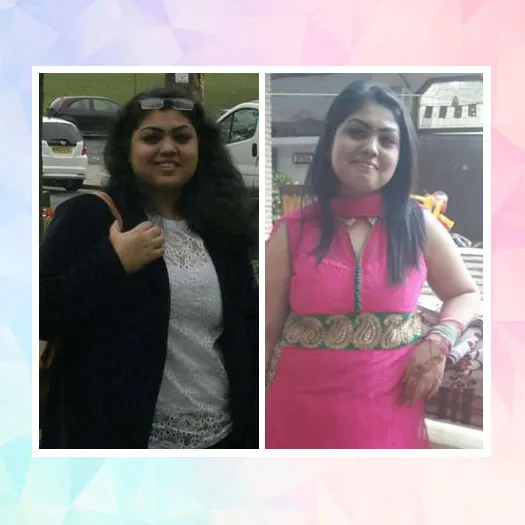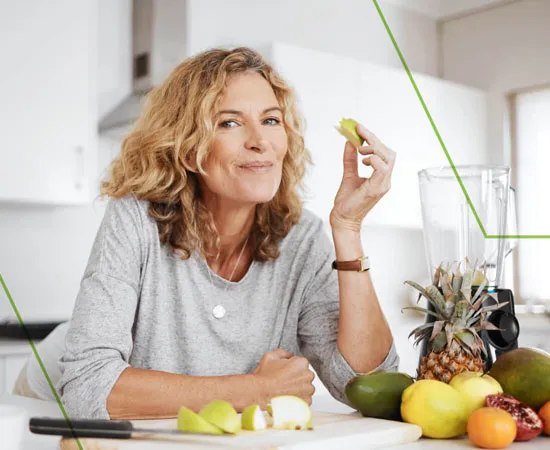- +91-9873452209, +91-9311692209, +91-8375978883
Our clients transformation
[Diabetes, PCOS & Weight Loss Expert in Gurgaon]











[Diabetes, PCOS & Weight Loss Expert in Gurgaon]












Finding the right dietitian for Menopause near you in Gurgaon has never been easier! Certified best nutritionist for Menopause in Gurgaon for your Lifestyle Wellness, Dt. Nidhi Sawhney provides you Best Diet Plan.
Dietitian for Menopause in Gurgaon, Best Dietician for Menopause Diet in Gurgaon, Nutritionist for Menopause Diet in Gurgaon. Most women dread the word menopause. In reality it affects women in completely different ways, but the most common symptoms include hot flushes, sweating, insomnia, anxiety, impairment of memory and fatigue. Long term consequences can include a decline in libido, osteoporosis, heart disease, even dementia – all linked to reduced oestrogen levels.
Typically, a woman's ovaries stop releasing eggs in her early 50s, and the menstrual cycle stops. Some women can sail through with only the odd hot flush, but others can struggle with symptoms such as weight gain and fluctuating emotions. The physiological reason why the body starts changing is largely down to the drop in oestrogen production and the effect this has on other hormones.
As the ovaries stop manufacturing the hormones oestrogen and progesterone, symptoms may begin. For example, oestrogen helps lift our mood so, when levels drop, we may feel depressed. Some women opt for hormone replacement therapy (HRT); others try natural remedies. Whether or not you decide to take HRT, following the guidelines below won't hurt and will assist in the pursuit of an all-round healthy lifestyle.
It has been noted that eating, and avoiding, certain types of foods can make the menopause a lot more bearable. Here are common problems those going through the menopause may face and some foods to watch out for…
Weight gain at menopause
During menopause your body will go through hormonal changes which make you more likely to gain weight. Typically this will occur around your abdomen rather than your hips and thighs. Hormonal changes alone don't necessarily trigger menopausal weight gain. This is usually related to ageing, lifestyle and genetic factors.
Muscle mass tends to reduce with age, while fat increases. Loss of muscle mass decreases the rate at which your body uses calories, which can make it more challenging to maintain a healthy weight. If you continue to eat as you always have and don't increase your physical activity, you are more likely to gain weight.
Menopausal weight gain can have serious implications for your health. Excess weight increases the risk of heart disease, type 2 diabetes and various types of cancer, including colorectal and breast cancer.
Dietary solutions.
Hot flushes
Stop eating foods that are likely to trigger or worsen hot flushes and night sweats. For instance, avoid stimulants such as coffee, alcohol and chocolate and spicy foods, especially at night – they're notorious for setting off hot flushes.
Tiredness
Avoid snacking on sugary foods – all too often a sharp rise in your blood glucose level may be followed by a sharp dip which leaves you feeling tired and drained. Choose fresh fruit with a few nuts instead.
Dry skin
Legumes, nuts and seeds such as pumpkin, sunflower, almonds contain vitamin E, zinc and calcium. These nutrients and the oils in nuts and seeds may help prevent dry skin and normalise hormone levels.
Depression and irritability
Ensure you eat enough protein foods which contain the amino acid tryptophan. You can find it in turkey, cottage cheese, oats and legumes. Tryptophan helps manufacture the neurotransmitter serotonin. Serotonin helps moods and may help control sleep and appetite which can make you feel better in yourself. Other useful strategies to help you feel less irritable are to eat breakfast and not miss meals to balance your blood sugar.
Eat more phyto-oestrogens
Phyto or plant oestrogens found in certain foods are oestrogenic compounds that bind with oestrogen receptor sites in the body cells, increasing the total oestrogenic effect. By acting in a similar way to oestrogen, they may help in keeping hormones a little more in balance. A high intake of phytoestrogens is thought to explain why hot flushes and other menopausal symptoms rarely occur in populations consuming a predominantly plant-based diet. Increase your intake of phyto-oestrogens by eating more: soya milk and soya flour, linseeds, tofu, tempeh and miso, pumpkins seeds, sesame seeds, sunflower seeds, celery, rhubarb and green beans.
With years of experience and satisfied customers,
we guarantee quality results.
Nidhi is simply amazzzing! She helped me lose 22 kilos in 8 months. Her plans are practical and easy to do. In fact... Read Full Testimonial
Very good diet plans, customised to my travel routine and hectic lifestyle. Had a wonderful experience with... Read Full Testimonial
I had joined NutriAdvice in Nov with 95 kgs of weight . Life had started to become difficult with my weight . My movements had... Read Full Testimonial
I joined Dr Nidhi Sawhney's diet clinic on the recommendation of one friend. I have had a very pleasant experience iny weight... Read Full Testimonial